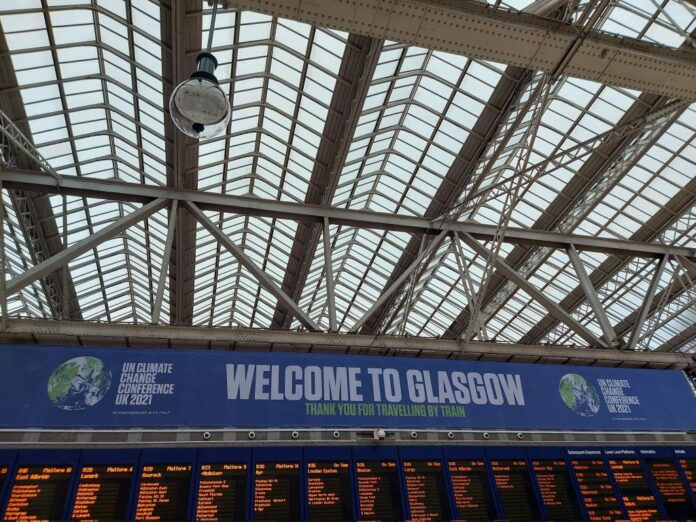When 196 nations finally put ink to paper in Glasgow last Sunday, the agreement we got is far removed from achieving the goals first set out in the Paris Climate Agreement in 2015. Based on commitments made from the participants we are on track to see Earth’s atmosphere warm by 2.4 Celsius (4.3 Fahrenheit) by the end of the century.
Promises were made that next year we would see improved targets to inch that number down closer to 2.0 Celsius (3.6 Fahrenheit), and maybe even closer to 1.5 Celsius (2.7 Fahrenheit), the desired Paris target.
Before the Glasgow meeting, the Intergovernmental Panel on Climate Change had issued a report that forecast 2030 to be the year we reach the 1.5 Celsius threshold based on commitments made prior to the conference. How much the needle will slow its move up the dial before that date is unknown. If the leaders of the world upon returning home actually do some of what has been promised, it may slow its climb. But make no mistake, currently they are kicking the can down the road rather than implementing policies and plans to meet what scientists tells us is the best of the worst case scenario, keeping us to no more than a 1.5 Celsius rise.
Another change from the Glasgow meeting is a pledge by all participants to increase the frequency of their reports to the United Nations. Going forward, countries will submit annual achievements in pursuit of net-zero with a plan to table progress at the same time and by 2024 to meet global standards for the data submitted. In other words, all participants will be working with the same data points.
And then there is the creation of a common market for carbon to cover prior efforts to establish emission credits and trades and ensure that projects to combat climate change through the replacement of fossil-fuel-burning thermal energy with green alternatives, afforestation and reforestation, and other measurable acts based on putting a value on carbon.
On the issue of fossil fuels, Glasgow represented the first time this subject appeared in the text in connection with a COP declaration. There was wording on ending fossil fuel subsidies, and watered down wording about the phasing down in the building and use of coal-fired energy. A group of countries agreed to stop continuing to fund out-of-country fossil fuel projects. And side deals were struck to cut global methane emissions.
Although not in the wording of the final communique, companies and investors in attendance at the meeting made announcements to support Paris Agreement goals through the phasing out of fossil-fuel-powered vehicles, the decarbonizing of air travel, the protection of forests and ocean environments, and commitments to focus on investments through a climate change lens.
Mitigation and adaptation are the two pillars upon which the entire structure built to tackle climate change rest. The Glasgow Climate Pact expresses a sense of urgency in supporting these two foundational pillars. Reduction in emission pledges addresses mitigation. But it is adaptation where the most vulnerable populations and nations are increasingly at risk, and where actions both in terms of financing and the lending of expertise should be prioritized. To this purpose, a working group is to begin its efforts immediately after Glasgow to address adaptation needs with the plan to put in place a plan by next year’s COP meeting in Sharm el-Sheikh, Egypt.
Adaptation finance discussions at Glasgow continued to show that the Developed Countries of the world were not keeping their promises to meet making $100 billion US annually available to Developing World and vulnerable communities in addressing climate change. Supposed to be in place in 2020, it now appears that the earliest date of onset will be 2023, with a not to exceed deadline date of 2025.
The Santiago Network, established at COP25 in 2019, is to serve in support of implementing approaches to reverse climate change damage already experienced, as well as to help in hardening infrastructure among populations and nations deemed most vulnerable to future extreme events associated with atmospheric and ocean warming, and sea level rise.
The last two pages of the final communique include wording that begins with a pledge “to move swiftly with the full implementation of the Paris Agreement” including the adoption of:
- common time frames for reporting as described above.
- agreement on common methodologies, modalities, and procedures related to reporting.
- recognition that the impact of climate change particularly on the Developing World (also mentioned previously) is disproportionately affecting the poorest and most vulnerable populations on the planet.
- actions to create just transitions in support of sustainable development globally to help eradicate poverty through financial means and the deployment and transfer of technology and attendant support.
Beyond countries, Glasgow’s final words call for international collaboration from non-government actors including participation by private business and industry, and civil society including non-government organizations, cities, local and regional governments, indigenous people, women, and young people.
At the conclusion of Glasgow, Alok Sharma, President of COP26 noted, “I think today we can say with credibility that we’ve kept 1.5 degrees Celsius within reach,” but its pulse is weak, and we will only survive if we keep our promises.”
Should that be how the rest of us see the Glasgow Climate Pact? I, for one, see COP26 as a stalling mechanism for countries like mine to continue to do the bare minimum. It is not just a failure of the Developed World’s biggest players, the U.S., E.U., Canada, Japan, and a few others, but also failure on the part of China and India in addressing the needs of those at the frontline of the climate crisis. The participants in Glasgow have shown no desire to be bold and transformative in their ambitions.
From those on the sidelines of the Glasgow meeting, particularly the young, there is little to be happy about the final communique. When asked, Nathalie Rengifo Alvarez, Latin America climate campaign director for Corporate Accountability expressed her frustration with the following diatribe:
“Why did we trust a process led by the same governments that are letting social, Indigenous, and environmental defenders be killed at home? Governments that overpower, loot, and impoverish nations? Governments that wave the flag of democracy and development to wage wars, destroy, and kill? Why did we trust a process that welcomed the corporations that created the crisis and are destroying our world, livelihoods, and health, while shutting out the people suffering from this violence? This process has failed us, and we must let it crumble. It is time for the people to reclaim control of our future, rather than let it die in the incapable hands of this useless process.”
She is one of the young to inherit the consequences of Glasgow’s tepid steps. She is among the youth that are wondering about the lack of resolve from national leaders. Their disappointment must be profound. But their resolve to push back I suspect will be felt in the coming months, because climate change is both their present and future.
















